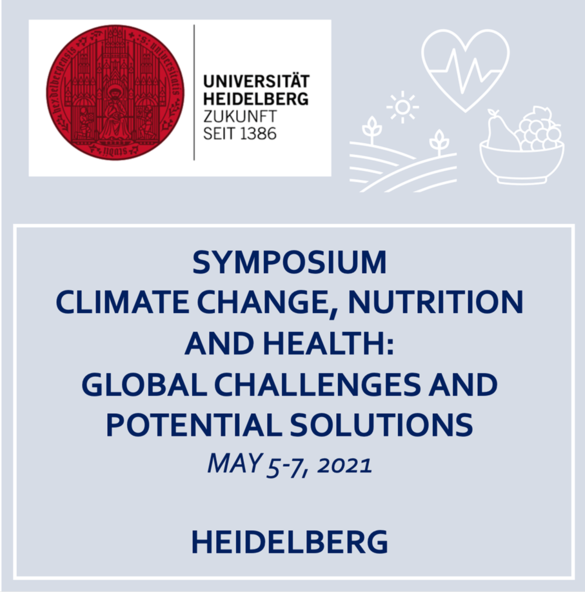Symposium Climate Change, Nutrition and Health: Global Challenges and Potential Solutions

The Heidelberg Institute of Global Health at the University of Heidelberg organized the international symposium “Climate Change, Nutrition and Health: Global Challenges and Potential Solutions“ on May 5 - 7, 2021. This symposium was funded by the German Research Foundation (DFG).
The relationships between climate change and nutrition constitute global challenges that require holistic solutions. Global warming, increased weather variability, and weather extremes threaten fragile food systems across the world. Populations in the Global South are at increased risk of health impacts as they are disproportionately exposed to climate change hazards, their livelihoods strongly depend on rainfed agriculture, and their capacity to adapt is limited. In parallel, unsustainable food consumption patterns and agricultural systems are among the major emitters of greenhouse gases, water waste, and land use, and contribute to rising prevalence of obesity and cardio-metabolic diseases.
This international symposium aimed at disseminating the current knowledge basis and exchanging the available methods for research into the relationships of climate change and nutrition. Distinguished speakers from climate change research, global health, agricultural sciences, and nutrition science shared their insights and discussed potential solutions to the challenges imposed by the nexus climate change-nutrition-health.
Wednesday, May 5 – Impacts and Mitigation
15:00-15:15 Welcome and introduction (Ina Danquah and Rainer Sauerborn, Heidelberg)
15:15-15:30 Climate Change and the World Health Summit (Axel Pries, Berlin)
Climate change impacts on nutritional status
Session chair: Rainer Sauerborn, Heidelberg
Keynotes
15:30-16:00 Planetary health and climate change, Andy Haines, LSHTM, London
| Time | Topic | Presenter |
| 16:00-16:15 | Projecting deaths from undernutrition from empirical time series in Nouna, Burkina Faso | Kristine Belesova, LSHTM, London and Heidelberg |
| 16:15-16:30 | Impact of ambient air CO2 concentration on nutrient content of food plants and consequences for human nutrition adequacy | Matthew Smith, Harvard University, Boston |
Mitigation through environmentally friendly diets
Session chair: Andrew Haines, London
17:00-17:30 Keynote: The global syndemic of obesity, undernutrition and climate change,
William Dietz, George Washington University, Washington D.C.
| Time | Topic | Presenter |
| 17:30-17:45 | Environmental impacts of obesity | Adam Drewnowski, University of Washington, Seattle |
| 17:45-18:00 | Healthy dietary patterns to mitigate climate change | Frank Hu, Harvard University, Boston |
| 18:00-18:15 | Life-cycle analysis (LCA) for greenhouse gas emissions of foods | Michael Clark, University of Oxfors, Oxford |
| 18:15-18:30 | Optimization modeling for the design of sustainable diets | Corné van Dooren, Vrije Universiteit, Amsterdam |
Co-benefits as drivers of climate-friendly diets
Session chair: Corné van Dooren, Vrije Universiteit, Amsterdam
| Time | Topic | Presenter |
| 19:00-19:15 | Sustainable diet index in the NutriNet-Santé Study | Julia Baudry, Sorbonne, Paris |
| 19:15-19:30 | Nutrition-related health co-benefits as a motivator for European households to reduce their carbon foot print | Alina Herrmann, HIGH, Heidelberg |
| 19:30-19:45 | Co-benefits of sustainable agricultural interventions | Lindsay Jaacks, University of Edinburgh, Edinburgh and Boston |
Thursday, May 6 – Adaptation
Nutrition-specific adaptation
Session chair: Ali Sié, CRSN, Nouna
15:00-15:30 Keynote: Nutrition interventions in Africa, Wafaie Fawzi, Harvard University, Boston
| Time | Topic | Presenter |
| 15:30-15:45 | Nutrition interventions in the INDEPTH population cohorts in Africa - an overview | Osman Sankoh, Statistics Council Sierra Leone, Freetown |
| 15:45-16:00 | Nutrition interventions in Kenya und Burkina Faso | Isabel Mank, HIGH, Heidelberg |
| 16:00-16:15 | Nutrition interventions in Madagascar | Christopher Golden, Harvard University, Boston |
Nutrition-sensitive adaptation
Session chair: Stephen Munga, KEMRI, Kisumu
16:45-17:15 Keynote: Evaluation of a nutrition-sensitive intervention in Bangladesh, Sabine Gabrysch, PIK, Charité, HIGH, Berlin
| Time | Topic | Presenter |
| 17:15-17:30 | Modeling climate change, agriculture and food production | Christoph Gornott, University of Kassel, Potsdam and Kassel |
| 17:30-17:45 | Climate change adaptation projects in Burkina Faso | Ali Sié, CRSN, Nouna |
| 17:45-18:00 | Lifetime cumulative rainfall exposure and risk of chronic undernutrition in Burkina Faso | Edmund Yeboah, HIGH, Heidelberg |
“Food systems and global health”
18:30 “Food systems and global health” - university-wide event
Held together with the “Student Society for Global Health" and the "Heidelberg Center for the Environment"
Invited keynotes:
Walt Willett, Harvard Chan School of Public Health, Boston
“Food in the Antrhopocene: The EAT Lancet Commission on healthy diets from sustainable food systems”
Till Bärnighausen, Heidelberg Institute for Global Health, Heidelberg University.
